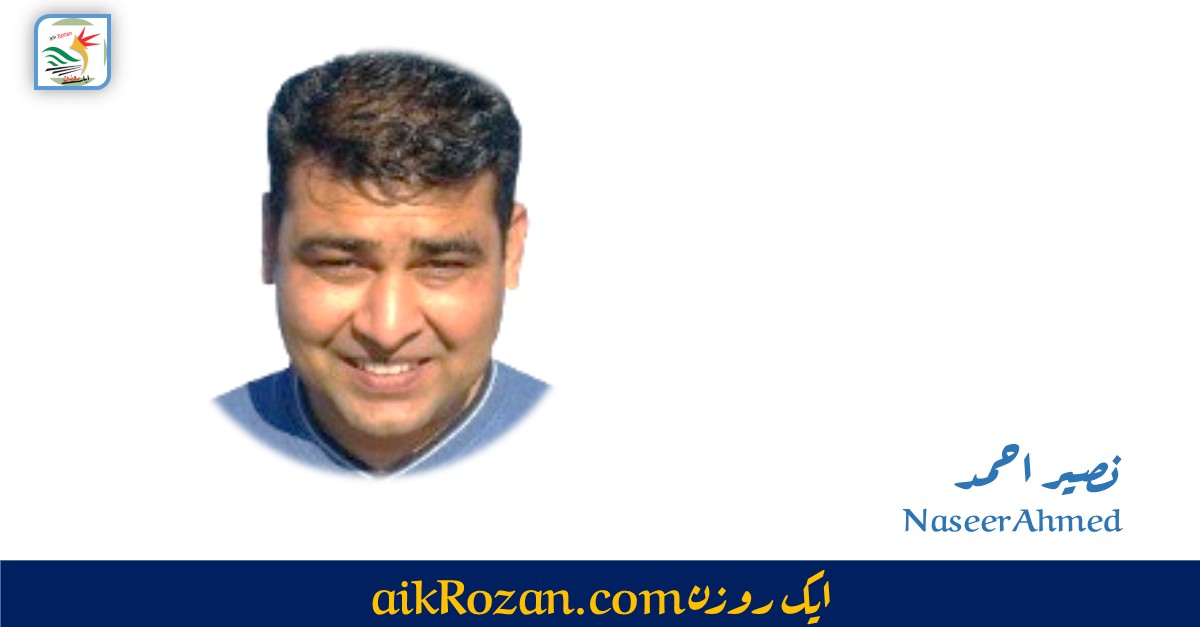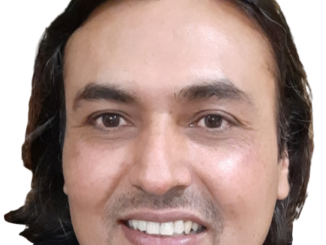
Coronavirus, a few thoughts
by, Naseer Ahmed
1
I don’t think nature is taking any revenge or God is angry with us. No real evidence for both things.
It is an attempt to make sense of things by being quite insensible which we do quite often .
It is a combination of bad luck and bad policies which often coincide.
Bad policies resulted from a switch towards irrationality and tyranny which directed us towards absolute control.
It was the ambition of both corporations and tyrants. It is also a consequence of a bit of overconfidence about creating our reality.
We thought with noisy media we could prove that idiocy is wisdom, tyranny is safety, irrationality is policy and lie is truth. It did not work.
When the virus was on the rise, we were negligent and arrogant. Life is connected and these connections have consequences.
Later, it seems China got a bit sensible and its ambition of absolute control worked for it in making things better. Still, you get sensible when you learn it the hard way. Here, what is good is being sensible, not absolute control. Sadly, the initial failure of absolute control ambition would be forgotten and they would go this ambition which is failing us on so many things in life.
However, being sensible is the main thing and if it is around, we could avoid pandemics and other forms of catastrophes.
If we regulate lockdowns sensibly by focusing on saving lives from both the virus and other innumerable possibilities connected to consequences of lockdowns, we would succeed in fighting off the virus.
Our activities on the planet have made life quite complicated. With all those complications, it is useless to go for simple formulas of tyranny around the revival of a distant glorious past and a glorious future. You have to keep the complexity of connectivity in mind and you have to be alert.
Travel spreads the pandemics. Not tough to know this simple thing. Sadly, our decision makers did not know that.
We could be a bit kind to those people who had no choice in electing this type of the decision makers but the ones who had choice in electing such decision makers of this responsibility not to elect them again.
The world was not prepared to deal with a pandemic adequately. That is what our health professionals told us many times. Yet, we chose to ignore this sound advice.
Why? it is not possible to be filthy rich without monopolies, cartels and tyrannies, and for tyrannies you have to promote a lot of irrationality. And irrationality makes you negligent and arrogant.
2
When confusion is used to dodge accountability on a massive scale, it is tough to be suddenly precise and clear.
The first problem comes from a worldview. If you sign into a worldview that views clarity as an enemy to your cherished worldview, you cannot avoid going into the foggy bog. That is the basic dodge to accountability because you are hundred percent sure about your worldview apparently. However, you don’t want to confront the problems connected to your worldview and you begin to resent clarity.
And the words lead to many interpretations.
An ideology you worship has different meanings, your own prejudices generated by your limited experience lead to different meanings and the meanings connected to clarity connected tools like commonsense, logic, scientific method, mathematical calculations, democratic laws lead to a different set of meanings. It is further complicated by your feelings and interests.
Therefore when an emergency sets in, you cannot make up your mind about its nature, type and extent. And you get quite conflicted about what constitutes a lockdown, a curfew or an emergency.
Ideally, there should be a kind of consensus around meanings of such important words based upon clarity connected aspects of life.
However, if you have not thought about these problems beforehand, you end up with endless versions of words like emergency, curfew and lockdown. It leads to so much confusion that which makes a coordinated response quite difficult.
When it is a question of life and death, this confusion is quite harmful. Your dodges become your fetters. You try to shoot in every direction while the crisis keeps escalating and generating more crises.
A social education system has trained all of us in this way. Therefore, in spite of intelligence, it becomes quite difficult for us to come up with a response that is clear and precise during an emergency.
It just becomes a kind of luck thing. If somebody has been wise before us and we happen to follow their wisdom for some reason, we might deal with an emergency a bit better. At times, it is sheer luck which we enjoy quite frequently while crossing a busy road. If that runs out, we suffer but we keep dodging all kinds of accountability. This process keeps us away from clarity.
I hope this pandemic subsides but here in Pakistan, we need to have a real meaningful dialogue where we could reach some consensus that focuses upon clarity in regards to important questions about our social, political, constitutional ,economic, intellectual, health, emergency response problems alongside many other problems.
3
In an emergency, duty ethics are reassuring, pleasure ethics are reassuring, legal ethics are reassuring, professional ethics are reassuring, virtue ethics are reassuring if they are connected to knowledge.
What is not reassuring is what Nietzsche was on about. Sadly, the decision makers are high on his stuff.
And the ones who review their Nietzsche like position on this emergency issue become a bit more beneficial to their people.
Yet, the rehabilitation of superman is quite strong and it is really tough to convince the leaders to drop it in spite of the fact that even a partial review leads to better outcomes.
And the ones who stick to some form of superman, they lead to a combination of idiocy and cruelty.
The other versions come from reason while this one comes from strong sentiments. The reason has this wonderful capability to make conscience perform better.
Still, you need a strong economic background to make conscience work better. And the people who invest in things connected to reason like democracy, science and institutions tend to perform better in an emergency.
However, at the moment, the news do not suggest better results of investment in knowledge and skills if you approach them from a sentimental point of view.
But if you think a bit more, it is difficult to ignore the benefits connected to reason.
However, it has been almost three decades of moving away from reason and freedoms as far as politics and society are concerned. And these delays in solving problems are the consequence of that distance which corporations promoted and anti-rationality and anti-democracy politics benefited from.
I hope that the pandemic does not spread too much in poor countries. It gives you a shudder when you visualize the consequences.
4
Lock down, yes but what about essential services?
It is not official yet and the crisis is already there. No see, but you have to help people in some way. And if these lockdowns thing is going to block all those ways, then the trolley problem is not only about Covid-19 but around other issues.
The hoarding and the short supplies are already on. If the government cannot help, at least, it should keep all those channels open where people could help other people. We need better thinkers as decision makers and that is the stuff we hate to the bits.
Well, it is a hope, luck, prayers and whatever you could do personally.
They are problems and there are solutions. We need to think better.
The need of the hour is clever thinking and lots of compassion. We need to drop these ancient Sadhu ways where human life and life itself is not important.
We must value life and try to protect it as much as possible and make it easy on fellow people as much as possible.
No need to get into the trolley problem where you have to choose who should live and who should die.
It gives very wrong signals about wealth which deepens this trolley problem. And people get more selfish than they are and they are already quite selfish.
We should take up responsibility and do whatever we can for people less unfortunate than us and the government must facilitate the process of support.
Around essential services, if it cannot be better, it should not make things worse by not thinking properly.
Actions have consequences and the government must think about consequences.
5
Well, South Korea had the capabilities. Therefore, they could be proactive.
We don’t have any kind of capabilities. We could be proactive only by challenging our anti-hygiene social education. That could be quite useful in containing Covid-19 and many other diseases like Hepatitis we are not hypersensitive about.
Health would become only a priority for a long time when we would start cherishing human beings as individuals. Our usual ways which are usually high on pretensions of love but real low on capabilities that could translate love into a practical reality are quite useless in solving health and safety issues.
That is a way to turn love into evidence but there our culture has developed a strong resentment to it. The highest good itself is annihilation of sense experience. That kind of stance helps us a lot to pretend to love without really loving. But it is not helpful in viewing individuals and their health as priorities. And that is not good to develop the capabilities around health that lead to proactive and effective responses.
Once we were touted as rising stars of development alongside South Korea. Now the difference is obvious. They are praised in a bit better international newspaper for their proactive response against the pandemic. In the same newspaper our response is described as ‘inhumanity’ in those quarantine camps of Taftan which were like our take on love just a pretension of quarantine.
At the moment our prime minister is also a pretension of a prime minister. To have a test, you have to travel 60 or seventy miles. Who is going to take this journey? It is down to luck and what we ourselves could do if we realise this importance of health and safety.
In the case of widespread incidences, if we are really lucky, it would be a blessing or we would pretend. Lots of things to pretend there. We are lucky to have the pandemic because it has strengthened our faith. We are lucky that the pandemic has shattered human confidence about disease prevention. Our ancestors knew this thousands years ago.
You could think up lots of feel good factors. However the difference between our response and South Korean is also a reality and it leads to important questions about human well being and governance. To answer those questions, we need to challenge our take on life.
The South Korean experience was not smooth according to a report. A church congregation there thought that salted water prevents the pandemic.This approach resulted in more infections but they had a system in place which identified everybody present in that service in order to test those people.
In the end, a governance system is better because it tries to fight against human follies.
However, when idiocy is a system of governance itself and Ableh is governor himself, you have to rely upon luck and whatever you could do personally.
All those people who took a different route to governance than our former competitors and all those people who insisted upon the most distorted versions of the governance have done a disservice to us and the people who keep insisting upon this way of governance are doing a disservice to us. And our lot, we cannot do much about any real change which is also doing a disservice to our country. But then again, we can pretend and our reality changes. Does it?




